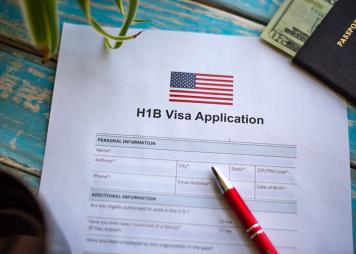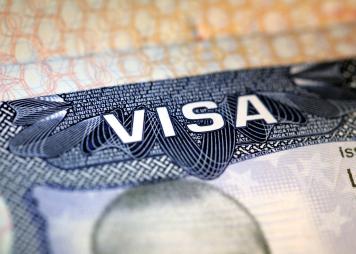Sponsoring a Work Visa

However, visa sponsorship also comes with its own set of challenges and considerations.
Here is an overview of the pros and cons, costs, time requirements, and the overall process of sponsoring a work visa in the U.S., so you can make an informed decision about whether it's worth it for your business.
Pros of Sponsoring a Work Visa
-
Access to skilled workers: Immigrants can bring specialized skills, expertise, and diversity to your workforce that might not be readily available among local candidates.
- Retaining talent: Offering to sponsor a current employee who may already be working temporarily or full-time is a great way to retain talent that is already trained, interested in the job and company, and committed to staying in the U.S. and potentially growing with the company.
- Filling skill gaps: If your business is struggling to find qualified candidates locally, sponsoring work visas can help you bridge the talent gap.
- Long-term commitment: Sponsorship can attract candidates who are more likely to stay with your company for the long term, as the visa ties their employment to your organization.
- Global perspective: Hiring immigrants can bring fresh perspectives and international experience, which can be valuable in a globalized business environment.
Cons of Sponsoring a Work Visa
-
Complex process: The visa sponsorship process can be intricate and time-consuming, involving a significant amount of paperwork and legal requirements.
- Costs: The costs associated with sponsoring a work visa can be substantial, including government filing fees, legal fees, and potential relocation expenses.
- Uncertainty: The visa application process doesn't guarantee approval, and changes in immigration policies could impact your employees' ability to stay in the country.
- Administrative burden: There's ongoing administrative work to ensure compliance with immigration regulations, such as tracking visa expiration dates and renewals.
Costs and Time Requirements
The costs and time requirements vary depending on the type of visa you're sponsoring. Some of the common work visas include H-1B, L-1, and O-1 visas. The costs can include government filing fees, which range from a few hundred to a few thousand dollars, legal fees for hiring an immigration attorney, and potential fees for premium processing or expedited services. The time required for the process can also vary, but it often involves several months from the start of the application to the employee's arrival.
Overall Process
-
Identify Eligibility: Determine which work visa category suits your employee's qualifications and your business needs.
- Labor Condition Application (LCA): For most employment-based visas, you need to obtain an approved LCA from the Department of Labor.
- File Petition: Prepare and submit the visa petition to U.S. Citizenship and Immigration Services (USCIS). This includes detailed documentation about the job, the employee's qualifications, and your business.
- Approval: Once USCIS approves the petition, the employee can proceed with the visa application at a U.S. consulate or embassy in their home country.
- Visa Interview: The employee attends a visa interview at the U.S. consulate/embassy and provides required documentation.
- Entry and Work: If the visa is approved, the employee can enter the U.S. and start working for your company.
Is Sponsoring an Employee’s Work Visa Worth It?
Deciding whether sponsoring work visas is worth it depends on your business's specific needs, the scarcity of skills in the local labor market, and your budget for recruitment and immigration expenses.
While the process can be complex and costly, the potential benefits of accessing skilled talent and diversifying your workforce can outweigh the drawbacks for some businesses.
However, it's important to stay updated on immigration policies, as they can change, potentially impacting your ability to hire and retain foreign employees. Consulting with an immigration attorney who specializes in employment-based visas can provide you with personalized advice based on your situation and current regulations.



